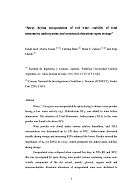Por favor, use este identificador para citar o enlazar este ítem:
https://repositorio.uca.edu.ar/handle/123456789/5460| Título: | Spray drying encapsulation of red wine : stability of total monomeric anthocyanins and structural alterations upon storage | Autor: | Álvarez Gaona, Izmari Jasel Bater, Caterina Zamora, María Clara Chirife, Jorge |
Palabras clave: | VINO TINTO; SECADO; GLICEROL; ENCAPSULACION; BEBIDA EN POLVO; ANTOCIANINAS | Fecha de publicación: | 2018 | Editorial: | Wiley | Cita: | Álvarez Gaona, IJ, Bater, C, Zamora, MC, Chirife, J. Spray drying encapsulation of red wine : stability of total monomeric anthocyanins and structural alterations upon storage [en línea]. Postprint del artículo publicado en Journal of food processing and preservation. 2018;14(2). Disponible en: https://repositorio.uca.edu.ar/handle/123456789/5460 | Proyecto: | Encapsulación de vinos tintos argentinos por secado spray y su potencial aplicación en alimentos | Resumen: | Abstract: Wine C. Sauvignon was encapsulated by spray drying to obtain a wine powder having a low water activity (aw). Maltodextrin DE10 was added to wine before atomization. The retention of Total Monomeric Anthocyanins (TMA) in the wine powder was found to be above 83%. Wine powder was stored under various relative humidities, and TMA concentration was determined up to 120 days at 38 °C. Anthocyanins decreased steadily during storage and increasing RH% enhanced the losses. Results stressed the importance of aw (or RH%) as a key control parameter for anthocyanins stability during storage. Encapsulated wine collapsed when exposed few days to 58% RH and 38 °C; this was investigated by spray drying wine model systems containing various nonvolatile components of the dry extract, namely glycerol, organic acids, and monosaccharides. Structural alterations of encapsulated wine were attributed to glycerol, main component of dry extract and which has a very low glass transition temperature. Practical applications The main practical application of this work is that it allows the wine to be transformed into a freely flowing powder by the addition of maltodextrin before the atomization stage in spray drying. The encapsulated wine contains 5 times the concentration of anthocyanins than that in liquid wine (both expressed in mg/100 g). This is the first published work on spray drying of red wine | URI: | https://repositorio.uca.edu.ar/handle/123456789/5460 | Disciplina: | INGENIERIA EN ALIMENTOS | DOI: | 10.1111/jfpp.13457 | Derechos: | Acceso Abierto | Fuente: | Postprint del artículo publicado en Journal of food processing and preservation 14 (2), 2018 |
| Aparece en las colecciones: | Artículos |
Ficheros en este ítem:
| Fichero | Descripción | Tamaño | Formato | |
|---|---|---|---|---|
| spray-drying-encapsulation-wine.pdf | 586,08 kB | Adobe PDF |  Visualizar/Abrir |
Visualizaciones de página(s)
258
comprobado en 30-abr-2024
Descarga(s)
676
comprobado en 30-abr-2024
Google ScholarTM
Ver en Google Scholar
Altmetric
Altmetric
Este ítem está sujeto a una Licencia Creative Commons

